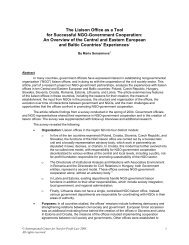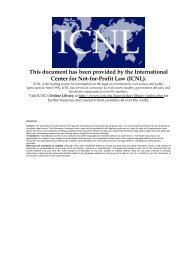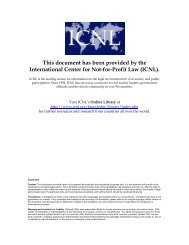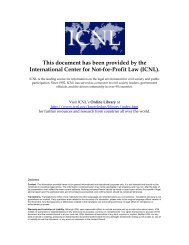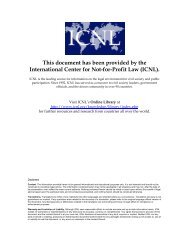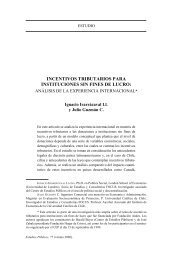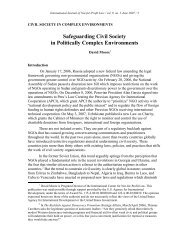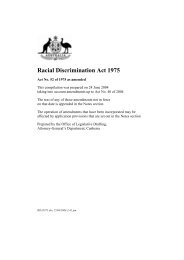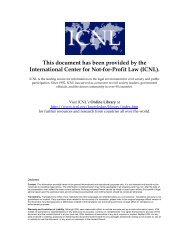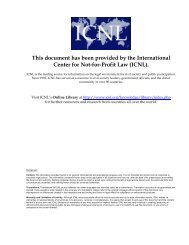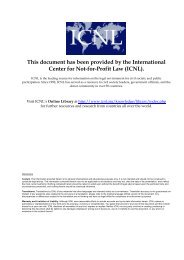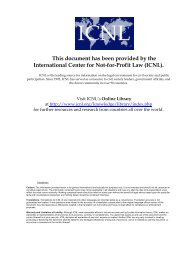National Policy for Non-Governmental Organisations - The ...
National Policy for Non-Governmental Organisations - The ...
National Policy for Non-Governmental Organisations - The ...
Create successful ePaper yourself
Turn your PDF publications into a flip-book with our unique Google optimized e-Paper software.
ABBREVIATIONSBCCBCDBNYCBOCCIMBOCONGOBONASOCORDEFONSAGGDPLOMCIMFDPMISAMLGMLHAMMEWAMOAMOEMOHMSPMWTCNDPNGORDCSADC-CNGOSMMESNVBotswana Christian CouncilBotswana Council <strong>for</strong> the DisabledBotswana <strong>National</strong> Youth CouncilBotswana Confederation of Commerce, Industry andManpowerBotswana Council of <strong>Non</strong> – <strong>Governmental</strong><strong>Organisations</strong>Botswana Network of AIDS Service <strong>Organisations</strong>Co-operation <strong>for</strong> Research, Development andEducationForum on Sustainable AgricultureGross Domestic ProductLiaison OfficersMinistry of Commerce and IndustryMinistry of Finance and Development PlanningMedia Institute of Southern AfricaMinistry of Local GovernmentMinistry of Labour and Home AffairsMinistry of Mineral, Energy and Water AffairsMinistry of AgricultureMinistry of EducationMinistry of HealthMinistry of State PresidentMinistry of Works, Transport and Communication<strong>National</strong> Development Plan<strong>Non</strong> <strong>Governmental</strong> OrganisationRural Development CouncilSouthern African Development Community – Councilof <strong>Non</strong>- <strong>Governmental</strong> <strong>Organisations</strong>Small, Medium and Micro EnterprisesNetherlands Development Organisation3
1. INTRODUCTION1.1 <strong>The</strong> Government of Botswana recognises the strategic role andcomplementary contribution of NGOs programmes in nationaldevelopment. In view of these, the Government takes cognisance ofthe urgent need to address and articulate the needs of the NGOsector in order to realise its potential.1.2 It is on this premise that the Government has developed the NGOpolicy. <strong>The</strong> policy provides a general framework to guide current andfuture development by the NGO sector and articulates therelationship and partnership modalities with government and otherdevelopment partners.2. BACKGROUND INFORMATION2.1 <strong>The</strong> Socio-Economic Environment2.1.1 Botswana has a population of 1.533 1 million people with a growth rateof 2.8% 2 per annum. At independence the population was largely ruraland mainly along the Eastern part of the country. With the expansionof economic activity the pattern of settlement has rapidly changedsince 1970’s. <strong>The</strong>re is now a growing concentration of the populationaround major urban centres and villages. 47% 3 of the population liveunder the poverty datum line. Poor communities can be found in bothurban and rural areas. <strong>The</strong> degree of poverty has been attributed toan unequal wealth distribution and or lack of access to factors ofproduction.2.1.2 In the past the major basis of economic growth has been miningespecially diamond as well as tourism, cattle, motor industries, andmanufacturing. Community utilisation of natural resources, has alsobegun to make a meaningful contribution to the national economy.1 Botswana Human Development Report 1997, UNDP2 NDP –8 , 19973 Botswana <strong>National</strong> Human Development Report, 1997, UNDP and Government of Botswana.4
2.1.3 Botswana’s average annual growth rate in GDP was 4.2% 4 between1993 and 1994. This growth has been affected by changes ininternational markets especially with diamonds causing a decliningtrend of 4.5% per annum 5 .2.1.4 In spite of its good economic per<strong>for</strong>mance issues of poverty;unemployment and the impact of HIV/AIDS pose major challenges tosustainable human development. Poverty and unemployment areassociated with the unequal distribution of wealth and hence affectthe quality of human resources.2.1.5 According to the Botswana Human Development Report, “ a majorconstraint faced by government has been the “limitation inimplementation capacity” 6 . This limitation has been associated with ageneral lack of sufficient skilled manpower to meet current demandboth in public and private sector. <strong>The</strong>re<strong>for</strong>e the establishment of apolicy framework to facilitate strengthening and expanding NGOs'participation in national development is strategic to the sectors role incomplementing current ef<strong>for</strong>ts in addressing the issues of poverty,unemployment and HIV/AIDS.2.2 <strong>The</strong> Situation of NGOs in Botswana2.2.1 Botswana has a large and growing NGO sector that is anchored in thedevelopment of the nation and guided by the principles of democracy,social justice, good governance and sustainable development. <strong>The</strong>majority of NGOs found in Botswana today are a result of postindependencedevelopment and their <strong>for</strong>mation was based oncommunity needs.2.2.2 Some NGOs are sectoral in nature while others are multisectoral.Those that are sectoral do not engage in more than one sectoralactivity. Those that are multisectoral engage in different developmentinitiatives such as health, education, capacity building and institutionalstrengthening, social welfare and environmental conservation amongothers. Notwithstanding the contribution that they have made to4 Botswana Human Development Report 1997 , UNDP5 Productive Awareness Handbook, BNPC 1999.6 Human Development Report, 1997 Pg. 635
national development over the years, the current challenge facingNGOs is how best the government development programmes can belinked with those of the sector in a manner that will enhance andbenefit the people of Botswana.2.2.3 <strong>The</strong> sustainability of NGOs has mainly depended on donor funding overthe last three decades. International NGOs and governments fromdeveloped nations have been supporting indigenous NGOs work indifferent areas of social welfare, poverty alleviation, disability,cultural development, environmental management, training anddevelopment of Small, Medium and Micro Enterprises etc. Supporthas often taken the <strong>for</strong>m of funds, personnel, equipment and technicalassistance.2.2.4 NGOs are currently experiencing a decline in donor support andundefined government and private sector support. <strong>The</strong> decline indonor support is as a result of the exit of major donors fromBotswana. Those that remain have substantially reduced their support<strong>for</strong> various reasons including global recession and the assumption thatBotswana has its own resources to meet development costs. <strong>The</strong>situation has had a negative impact on the participation andcontribution of NGOs in national development and promotion of socialwelfare. In particular donors are no longer willing to fundadministrative costs such as personnel and equipment.2.2.5 <strong>The</strong> unstable financial situation of NGOs is also partially as a result oflack of defined government and private sector support to theseorganisations due to the absence of a national NGO policy.2.2.6 This policy will help to mobilise resources <strong>for</strong> NGOs. One of theinnovative ways that will encourage private sector support to NGOs istax exemption <strong>for</strong> funds donated to NGOs.2.3 <strong>The</strong> Process Leading to the <strong>Policy</strong> Development2.3.1 BOCONGO was <strong>for</strong>med in 1995, due the realisation by NGOsthemselves that their development ef<strong>for</strong>ts were uncoordinated andfragmented. <strong>The</strong> government of Botswana also encouraged andsupported the <strong>for</strong>mation of Botswana Council of NGOs – BOCONGO.6
<strong>The</strong> mandate of BOCONGO is to co-ordinate the NGO movement inBotswana and to facilitate the establishment of an enablingenvironment <strong>for</strong> NGO work. <strong>The</strong> Council is also responsible <strong>for</strong>networking, capacity building, and the mobilisation of resources <strong>for</strong>NGO sector. Since then both the government and the Council hasendeavoured to strengthen the relationship, partnership and to createan enabling environment between NGOs and the government <strong>for</strong> equalparticipation in development.2.3.2 In 1996, the Government invited NGOs to participate and makesubmission to NDP-8. This initiative marked a new era of collaborationand partnership building between the government and the NGOs. <strong>The</strong>initiative has opened a window of opportunity <strong>for</strong> the improvement ofrelationships between NGOs with District Councils and other localauthority institutions.2.3.3 <strong>The</strong> Government’s commitment to the development of an NGO policy isfurther articulated in NDP-8 i.e. “ a comprehensive policy on NGOswill be <strong>for</strong>mulated during NDP 8, which will <strong>for</strong>m the basis <strong>for</strong>government’s relationship with NGOs, and spell out how NGO activitiesare co-ordinated” 7 .2.3.4 <strong>The</strong> Government has expanded on the above commitment to work withNGOs in Vision 2016 by stating that “NGOs are playing an importantrole in the development process, and their existing foundation andexperiences should be harnessed <strong>for</strong> the future implementation of thevision’s strategies. <strong>The</strong>ir capacities should be strengthened as keypartners in development, to effectively compliment government andprivate sector activities” 8 .3. RATIONALE FOR AN NGO POLICY<strong>The</strong> rationale <strong>for</strong> this policy is based on the following premise: -3.1 <strong>National</strong> development is the responsibility of all people includinggovernment, NGOs and other sectors. This responsibility should be7 <strong>National</strong> Development Plan 8 , 1997 pg. 4488 Vision 2016,1996 pg.647
influenced by clear national policies that identify the roles andresponsibilities of the various national development partners.3.2 Effective participation and hence contribution by the NGO sector tothe development process is enabled by the existence of democraticinstitutions, social justice, sound economic management and prudence,and political wisdom. Botswana is proud to have all of thesepreconditions of sustainable development.3.3 NGOs are an important sector in national development. As withgovernment and the private sector, they are strategic institutionsthat facilitate the development and sustenance of a vibrantdemocracy. Experience has also shown that NGOs are key in promotingpeoples participation. As the economy unfolds, the role of NGOs willcontinue to increase and expand. By creating alliances withgovernment and the private sector, the NGO sector will strengthenthe environment in which real democracy can flourish. This underlinesthe need <strong>for</strong> a healthy civil society that is supported by NGOs, theprivate sector and the Government.3.4 By supporting NGOs, Government and the business community will beinvesting in the future of a vibrant economy and hence the nation -and the activities of NGOs make up a powerful civil society that buildssocial stability, public trust, and the respect <strong>for</strong> the rule of law.3.5 <strong>The</strong> NGO sector has been involved in development beyond traditionalsocial welfare activities. <strong>The</strong>se organisations have played an activerole in rural development, policy advocacy and community capacitybuilding initiatives. <strong>The</strong>ir contributions went largely unrecognised untilthe early 1990’s. <strong>The</strong> first explicit recognition of the role of thesector is articulated in NDP-7 that states:-“Much relevant work is done by communitiesthemselves through traditional communityinstitutions, self help activities e.g. developmentcommittees and non-governmental organisation.Government aims to facilitate and supportef<strong>for</strong>ts to work with such organisations,8
ut not supplant them” 93.6 <strong>The</strong> creation of an enabling environment <strong>for</strong> NGOs is highly dependenton the successful implementation of this policy. Past experience hasshown that without a clearly defined policy:-3.6.1 Relationships between NGOs, government and the privatesector are difficult and in most times strained.3.6.2 Access to in<strong>for</strong>mation, services and support from governmentand other stakeholders is not guaranteed and sometimesdenied.3.6.3 <strong>The</strong>re is no clear understanding of the roles, responsibilitiesand procedures <strong>for</strong> making strategic decisions.<strong>The</strong>se affect the development process and hence a policy frameworkwill be essential to address the situation.4. DEFINITION, CHARACTERISTICS AND CLASSIFICATION OFNGOs IN BOTSWANA4.1 Definition of NGOs within the Context of the <strong>Policy</strong><strong>The</strong> policy defines NGOs as legally <strong>for</strong>med autonomous organisationsthat possess non-profit status whose primary motivation is to improvethe well being of the people. <strong>The</strong>y are service driven and serve indiverse and complex activities that relate to the developmentprocesses that promote social trans<strong>for</strong>mation and sustainabledevelopment. This definition does not include political parties ororganisations pursuing political interests. NGOs view development interms of a participatory process of capacity building andempowerment of communities to improve their socio-economicwellbeing and expand sustainable livelihood opportunities.9 <strong>National</strong> Development Plan 7, 1991 Pg. 3869
9.5.3 NGOs will, through the Liaison Officers and the parentMinistry, share in<strong>for</strong>mation on their plans and programmes withgovernment9.5.4 A <strong>for</strong>um will be established where Liaison Officers will have anopportunity to share strategic in<strong>for</strong>mation in relation to theoperationalisation and implementation of this policy.9.6 <strong>The</strong> Implementation Mechanisms of the <strong>Policy</strong>In order to implement the objectives of this policy, it is necessary tooutline and describe the various levels of interaction and approachesbetween stakeholders. <strong>The</strong> policy will promote a participatorymultisectoral approach in its implementation. <strong>The</strong> multisectoralapproach will be implemented through the following mechanisms:9.6.1 Mechanism I – Tripartite Arrangementi. Upon the adoption of this policy, Government will convene anNGO <strong>Policy</strong> Council to advise the government and monitor theimplementation of the policy. Its membership will be drawnfrom NGOs, Government and the Private Sector as defined insection 10.1.ii.<strong>The</strong> Council will regulate its roles and responsibilities, andconduct its functions in accordance with the provision ofsection 10 of this policy and within the framework of approvedRules and Regulations.9.6.2 Mechanism II – Parent Ministry<strong>The</strong> parent Ministry will undertake to: -i. Provide the custody <strong>for</strong> the NGO policy.ii. Co-ordinate the affairs of NGOs as far as this relate to policyand institutional management issues. Programme implementationco-ordination shall be the responsibility of individual lineministries16
iii. Review and develop new policy directions on matters pertainingto NGOs in close collaboration with the NGO sector and theNGO <strong>Policy</strong> Council.iv. Promote collaboration and co-operation among governmentministries with NGOs.v. Distribute relevant in<strong>for</strong>mation and research studies to NGOsthrough BOCONGO and other NGO sectoral mechanisms thatalready in place.vi. Develop mechanism <strong>for</strong> channelling financial support to NGOs inan efficient and effective way through the line ministries, in amanner that will avoid duplicate funding.vii. On regular basis, commission financial audits on the Books ofAccounts of BOCONGO to monitor and evaluate the financialmanagement procedures of the Council.viii. Encourage line ministries to actively promote NGOsunderstanding in the public sector.ix. Keep track of all NGOs reports submitted to government, <strong>for</strong>proper record keeping and institutional memory withingovernment of NGOs contribution to development.x. Provide tax exemption to private sector and individuals inrelation to monetary and material contributions and support toNGOs.9.6.3 Mechanism III – Private Sector<strong>The</strong> Private Sector will endeavour to strengthen their partnership andcollaboration with NGOs in development initiatives. <strong>The</strong> PrivateSector through Botswana Confederation of Commerce, Industry andManpower (BOCCIM) and other business organisations, shall beresponsible <strong>for</strong> co-ordinating the affairs of the Private Sector vis-àvisNGOs as appropriate and relevant. In particular the private sectorshould seek to: -i. Support NGOs programmes financially and technicallyii. Commission research studies from time to time and shareresearch results with NGOs on socio-economic development inthe country.17
iii.Support the sustainability of the NGO sector by stimulatingdomestic philanthropy.9.6.4 Mechanism IV– <strong>The</strong> Donor Communityi. <strong>The</strong> donor community should endeavour to strengthen theirrelationship with NGOs as equal partners in development with acommon objective of improving the socio-economic wellbeing ofcommunities.ii. In view of this donors should facilitate adequate resource flowsbased on viable and sound project proposals by respectiveNGOs.iii. Donor should also support NGOs in developing self-reliance andsustainability initiatives9.6.5 Mechanism V – NGOs<strong>The</strong> co-ordination of this sector shall be through BOCONGO. Forpurposes of this <strong>Policy</strong> BOCONGO shall have the following functions:-i. Co-ordinate all NGO affairs in relation to this policy throughsector co-ordinatorsii. Maintain an effective interface between the central and localgovernment and with NGOsiii. Support the sector co-ordinators in the implementation of thispolicy by providing technical assistance.iv. From time to time conduct organisational capacity assessmentof NGOs so as to be better in<strong>for</strong>med of existing capacity gapsthat need to be strengthenedv. Monitor the implementation of the policy at local and nationallevels.vi. Facilitate periodical sector co-ordinators meetings <strong>for</strong> purposesof reflecting on the implementation of the policy and relatedissues.vii. Carry out lobbying, advocacy and networking on behalf of NGOsand in particular on the implementation of the policy.viii. Maintain a database of all NGOs in the country.18
ix. Be responsible <strong>for</strong> the disbursement of funds provided throughthe policy to NGOs.x. Have the mandate to commission a financial audit on the booksof accounts of those NGOs that are funded through the policy.1O. COORDINATION OF THE POLICY IMPLEMENTATION<strong>The</strong> policy will be implemented through the following institutionalmechanism: -10.1 <strong>The</strong> NGO <strong>Policy</strong> Council10.1.1 An NGO <strong>Policy</strong> Council shall be <strong>for</strong>med to advise the government onthe implementation of the policy as mentioned in section 10.2.1 (i)10.1.2 <strong>The</strong> Council shall also monitor the implementation process incollaboration with the NGO sector.10.1.3 <strong>The</strong> Council shall have 19 members representing the variousstakeholders as follows:-i. Government Ministries:-• Ministry of Finance and Development Planning,• Ministry of Local Government• Ministry of Health,• Ministry of Labour and Home Affairs,• Ministry of Commerce and Industry,• Ministry of Agriculture,• Ministry of Education,• Office of Attorney General,• Ministry of Lands, Housing and Environment,ii. 2 – representatives from the Private Sectoriii. 8 - representative from BOCONGO10.2 <strong>The</strong> Terms of Reference <strong>for</strong> the NGO <strong>Policy</strong> Council<strong>The</strong> Council shall be guided by the following terms of reference:-19
i. Co-ordinate the implementation of the policy in collaborationwith the Parent Ministry and the NGO sectorii. Facilitate a participatory monitoring and evaluation of the policyimplementation and its impact on NGO sectoriii. Facilitate the review of the policy and advise the governmentand other stakeholders on appropriate action.iv. Ensure harmonisation of the policy with other policies to avoidpotential duplication or conflict.v. Facilitate a better and more widespread understanding ofNGOs, how they operate and the benefits they confer ondevelopment ef<strong>for</strong>ts by the various sectors and otherstakeholders.vi. Encourage a systematic application and replication of bestpractices in NGO institutional development, governance andprogramme development and management.vii. Promote the development of other sources of funding <strong>for</strong> NGOactivities e.g. the establishment of an endowment fund,development of joint ventures, awarding of contracts to NGOsbased on merit and competence and the establishment of anational lottery that would benefit NGO programme.viii. Facilitate effective government support to NGO programmesthrough line Ministries by allocating financial resources at thetime of the <strong>National</strong> budget planning and or by providing fundingthrough the Endowment Fund.viii. Stimulate domestic philanthropic impulses and ultimatelygenerate significant private contributions <strong>for</strong> socio-economicdevelopment through NGO programmes.ix. Provide overall policy guidance on all aspects of NGO operationsand activities within the framework of this policy.x. <strong>The</strong> Council shall meet quarterly. Special or extra ordinarymeetings of the Council shall be convened as need arises.11. STAKEHOLDERS INPUTS FOR THE IMPLEMENTATION OF THEPOLICY<strong>The</strong> following inputs shall be required <strong>for</strong> the effective co-ordination,implementation, monitoring and evaluation of the policy.20
11.1 Financial resources11.2 Identified parent Ministry11.3 Liaison Officers in selected line Ministries11.4 A tool <strong>for</strong> participatory monitoring and evaluation of theimplementation process.12. MONITORING AND EVALUATION OF THE POLICY12.1 <strong>The</strong> policy will be evaluated periodically to ensure that itremains responsive and relevant to the needs of NGOs andthose of other stakeholders. <strong>The</strong> implementation of the policywill also be monitored and evaluated regularly to ensure thatthe objectives of the policy are being achieved.12.2 <strong>The</strong> Monitoring and Evaluation processes and the timing <strong>for</strong> itshould relate as much as possible to district and nationalplanning cycles.12.3 <strong>The</strong> Council shall be responsible <strong>for</strong> the overall monitoring andevaluation that is referred to in sub section 13.113. REVIEW AND AMENDMENTS OF THE POLICY13.1 <strong>The</strong> NGO <strong>Policy</strong> Council shall be responsible <strong>for</strong> the review ofthe policy in consultation with other stakeholders13.2 <strong>The</strong> policy will be reviewed periodically on the basis of strategicin<strong>for</strong>mation obtained through participatory evaluation13.3 <strong>The</strong> Council shall make recommendations to government onamendments if any to the policy.13.4 <strong>The</strong> policy will initially be evaluated after three years andthereafter as need arises21
14. ANNEXESAnnex 1 - FRAMEWORK OF THE NGO CODE OF CONDUCT 121. INTRODUCTION<strong>The</strong> increased demand <strong>for</strong> NGOs to be accountable, transparent andpractice good governance, has necessitated the need <strong>for</strong> an NGO codeof conduct. In most cases NGOs attempt to be accountable,transparent, practice good governance and adhere to their basicvalues and professional ethics. However, some violate the veryprinciples they claim to stand <strong>for</strong>. NGOs there<strong>for</strong>e consider itnecessary to develop a voluntary tool i.e. the code <strong>for</strong> NGOs toregulate themselves in a more professional and ethical way.2. DEFINING THE CODE OF CONDUCTA code of conduct is defined as “ a prevailing standard of moralbehaviour. It is a voluntary instrument that assists individualorganizations and the people that serve in them to conduct businessand relate with one another in such a manner that their conduct isseen as a reflection of their values, good governance and an honestdesire to be transparent and accountable”.3. STRATEGIC ISSUES CONSIDERED IN THE NGO CODE OFCONDUCT<strong>The</strong> code of conduct focuses on issues of moral and ethical conduct,and values rather than mandatory policy and or legally bindingrequirements in the way NGOs conduct business. <strong>The</strong>se issues includethe following:-3.1 ENABLING ENVIRONMENTi. A commitment by all stakeholders to create an enablingenvironment that promotes and supports the concept of12 <strong>The</strong> framework is not the code of conduct it outlines the issues that constitute the body of theactual code of conduct.22
ii.iii.voluntary action, appreciates the NGO sector’s role and has aclear policy and legal framework that guide and in<strong>for</strong>m NGOs’work.An operational environment, that recognizes, respects andpreserves the independence, autonomy and constitutional rightsof NGOs. In so doing sustain the freedom of association,expression and conscience.An enabling environment that will promote democraticparticipatory development among NGOs and with their partners.3.2 VALUESi. NGOs are diverse entities and pursue different interests withina common value system that is based on the desire to improvethe welfare of the people, increase people’s awareness of theirdevelopment issues and to become the voice of the voiceless.ii. <strong>The</strong> values of NGOs underpin their vision, mission andobjectives there<strong>for</strong>e constitute the foundations <strong>for</strong> projectdesign implementation, management and external relations.iii. <strong>The</strong>se values promote a people centred development andrespect <strong>for</strong> human rights, culture and history of a people.3.3 TRANSPARENCYi. NGOs are committed to being transparent not only to theirdevelopment partners but also to the people their serve andtheir staff.ii. NGOs are committed to promote transparency throughsystematic dissemination of in<strong>for</strong>mation to all stakeholders.iii. Each organization shall endeavor to fulfil legal andconstitutional requirements such as financial accountability,reporting and adherence to the laws and policies that governtheir operations.3.4 GOVERNANCENGOs recognize that:23
i. Good governance is a product of participatory evolutionaryprocess that empowers people and brings them to the centerstage in decision making. And also provides adequate politicaland social space to people and organization’s <strong>for</strong> them todetermine their niche, roles and responsibilities in society anddevelopment in general.ii. Good governance is dependent on the existence of democraticinstitutions within an organization such as Board of Directors,Management committees and Councils.iii. <strong>The</strong> foundations of good governance also include the existenceof social justice, political wisdom and the ability to accept theshifting balance of power from institutions to people andcommunities.3.5 PARTNERSHIPi. NGOs committed themselves to develop sustainablepartnerships that are built on the principles of equality, trust,and honesty. True partnerships respect individual institutionalvalues, policies, vision and objectives. Partners will worktogether to find solutions and achieve agreed goalsii. NGO translate their partnership with other developmentorganizations as pooling resources, sharing power in bothdecision making, planning together, promoting effectivecoordination, improving coordination respect the independenceand autonomy of each other and their democratic and legalrights.3.6 ACCOUNTABILITYiii.iv.NGOs will endeavor to be accountable to their donors, staff andproject beneficiaries.NGOs are also committed to be accountable <strong>for</strong> their actions inrelation to respecting human rights, peoples’ culture andhistory.3.7 FUNDRAISING24
i. NGOs will promote ethical and professional fund raisingpractices that promote transparency and honesty.ii. In addition as much as practicable NGOs will minimizecompetition <strong>for</strong> resources by pooling together in fundraisingef<strong>for</strong>ts and strategies.NGOs will adhere to best practices in fundraising includingprovision of all essential in<strong>for</strong>mation to the donor orgovernment that would enable them to make in<strong>for</strong>med decisionsand choices when considering funding NGO projects.iii. As a strategy to move towards sustainability NGOs willdiversify funding sources.3.8 FINANCIAL MANAGEMENTNGOs are committed to ensurei. Proper financial accountabilityii. Maintenance of proper financial recordsiii. Provision of mandatory financial in<strong>for</strong>mation to government asdefined by lawiv. Establish institutional based sound financial managementpolicies, procedures and systemsv. Establish an effective financial monitoring system throughproper accounting books and records keeping.3.9 MANAGEMENT OF HUMAN RESOURCESi. NGOs will recruit their staff on the basis of competence,professional qualifications and will avoid recruitment on basis offriendship or otherwise.ii. NGOs will endeavour to fulfil basic needs of needs of theirstaff as far as resources permit without discrimination by sex,age, education or colour.iii. NGOs are committed to developing clear policies, guidelines andprocedures that relate to staff welfare, development or theirrights in the organization.25
3.10 NGO MANAGEMENTi. NGO will base their management on clear understanding of rolesand responsibilities at all levels of the institutions, in particularbetween Boards and secretariats, and Between Directors andthe rest of the staff.ii. NGOs are committed to maintaining high standards,transparency and democratic ways in decision-making process.3.11 NGO AUTONOMY AND INDEPENDENCEi. NGOs recognize that their strength is based on their autonomyand independence. <strong>The</strong>y will endeavour to guard this withintegrity.3.12 ENHANCING THE PARTICIPATORY PROCESS.i. NGOs will commit themselves to promote and supportparticipatory approaches in all aspects of institutional andsocio-economic development programmes there are involved in.ii. Participation by staff or project beneficiaries shall be the normor the policy and not an option or a privilege <strong>for</strong> a few people.3.13 CAPACITY BUILDINGi. NGOs will promote and support capacity building as “theprocess by which individuals, organizations and institutions shalldevelop their abilities individually and collectively to per<strong>for</strong>mfunctions, solve problems and set and achieve (strategic)objectives 13 .3.14 COOPERATION AND NETWORKING AMONG NGOsi. <strong>The</strong> strength and impact of NGOs is more effective whenacting together rather than individually. NGOs will strive tobuild partnerships and create collaborative interventions. <strong>The</strong>y13 UNDP’s management development and governance Division, 199726
will also improve networking among themselves and with otherpartners.3.15 COMMUNICATIONi. NGOs will strive to improve their communication strategies andthe messages contained therein. Communication must have anobjective and a clear target.ii. Communicating shall respect the dignity, community values,history, religion, culture and education of the people beingtargeted including staff.3.16 COORDINATIONi. NGOs will commit themselves to improve coordination amongthemselves and their development partners including thegovernment.ii. NGOs have a moral responsibility to stay united and to avoidconflicts, rivalry and misuse of resources, whether human,financial and/or technical.3.17 REPRESENTATION AT BOTH REGIONAL ANDINTERNATIONAL FORUMSi. Participation should be considered on merit and in particular inrelation to programme focus of individual organizations. NGOsshall guard against competing <strong>for</strong> participation in internationalworkshops and seminars based on personal interest.3.18 PROGRAMME DEVELOPMENT AND MANAGEMENTi. NGOs will promote people centered development that in allaspects is responsive to their needs and aspirations.ii. NGOs will ensure that any project shall not undermine thevalues and traditional practices of the people.27
4. MONITORING AND EVALUATION OF THE CODE OF CONDUCTIMPLEMENTATION PROCESSAn effective monitoring and evaluation mechanism shall bedeveloped and all NGOs ratifying the code will adhere to it.NGO will monitor and evaluate their individual per<strong>for</strong>mance. Inaddition other NGOs in the same sector will also act as peermonitors and evaluators.<strong>The</strong> process and strategies shall focus on both qualitative andquantitative aspects.5. THE MANAGEMENT OF THE IMPLEMENTATION OF CODE OFCONDUCTi. NGOs will define strategies and institutional arrangements <strong>for</strong>the coordination of the code.6. THE CAPACITY OF NGOs TO IMPLEMENT THE CODE OFCONDUCT.i. <strong>The</strong> implementation of the code of conduct will require anextensive process of sensitization and awareness creationamong NGOs and with other development partners. It willrequire action at three levels of society i.e. national level,networks, staff and project beneficiary levels.ii. <strong>The</strong> implementation will require NGO capacity building andstrengthening, especially in the following areas:• In<strong>for</strong>mation dissemination and awareness creation• Monitoring and evaluation• Stakeholders empowerment to be able to understand theimplication of the code on their individual conduct and howthat may affect their organisations.28
ANNEX 2 -THE SECTORAL CLASSIFICATION OF NGOS INBOTSWANA1. Introduction<strong>The</strong> policy takes cognisance that NGOs operate as individual organisationsand or groups with similar interest or concerns. For purposes of this policythey are organised by networks and coalitions according to their sectors ofoperation. <strong>The</strong> role of networks and coalitions is to facilitate in<strong>for</strong>mationsharing, exchange of ideas and experiences, networking and capacitybuilding. <strong>The</strong>ir secretariats also facilitate dialogue with key individualorganisations and international and regional development agencies, bothbilateral and multilateralGiven the dynamics of change in the environment in which they operate, thecomposition and nature of each sector may change over time. <strong>The</strong> policyclassifies NGOs in Botswana under the following sectoral networks orcoalitions.1.1 Development Arm of Religious <strong>Organisations</strong>At present the sector is co-ordinated by Botswana Christian Council(BCC). However other religious networks will be accommodated as theyemerge. <strong>The</strong> key areas of intervention that reflect the mainchallenges the sector face include: - promoting church unity,counselling and specialised ministries, contextualisation of theory andecumenical spirituality, enabling the poor to live a better life, care <strong>for</strong>people in need, and advocacy <strong>for</strong> the marginalised and oppressed.1.2 Disability<strong>The</strong> sector is co-ordinated by the Botswana Council <strong>for</strong> the Disabled(BCD). One of the main aims of BCD is to lobby and advocate <strong>for</strong> thewelfare of people with disabilities. <strong>The</strong> Council has also theresponsibility to mobilise resources <strong>for</strong> capacity building, monitoringand evaluation of programme delivery by stakeholders directly orindirectly involved with the welfare of people with disabilities.1.3 Environment and Sustainable Agriculture29
NGOs dealing with conservation, environmental issues and sustainableagriculture are co-ordinated by the Forum on Sustainable Agriculture(FONSAG). FONSAG is a <strong>for</strong>um <strong>for</strong> promoting needs orientedsustainable environmental and agricultural practices in partnershipwith farmers, NGOs, government and private sector institutions.FONSAG also promotes best practices on sustainable agriculture andenvironmental conservation.1.4 Population, Health and HIV/AIDSNGOs that deal with health issues including HIV/AIDS are coordinatedthrough Botswana Network of Aids Service <strong>Organisations</strong>(BONASO). BONASO’s role is to co-ordinate and facilitatenetworking, health related programme implementation, resourcemobilisation, policy advocacy, and capacity building and institutionalstrengthening <strong>for</strong> its member organisations. BONASO representsNGOs at the <strong>National</strong> Aids Council.1.5 Human RightsThis sector is co-ordinated by DITSHWANELO – Botswana Centre<strong>for</strong> Human Rights. <strong>The</strong> sector’s objective is to expand publicawareness and knowledge of human rights. <strong>The</strong> sector also advocates<strong>for</strong> the development of appropriate laws that take cognisance of basichuman rights and promotes the protection of such rights. <strong>The</strong> sectorpays specific attention to the interests of marginalised,underprivileged and discriminated persons.1.6 Media:This sector is co-ordinated by Media Institute of Southern African– Botswana (MISA). <strong>The</strong> sector aims to defend and promotefreedom of expression of the media and lobbies <strong>for</strong> the removal ofobstacles and impediments to the free flow of in<strong>for</strong>mation.1.7 Small, Medium and Micro EnterpriseThis sector, which is co-ordinated by Co-operation <strong>for</strong> Research,Development and Education (CORDE), provides training andmanagement advisory services mainly to small and medium enterprises.30
<strong>The</strong> overall objective is to widen the socio-economic options of ruralpeople through Small, Medium and Micro Enterprises (SMME).1.8 Women, Gender and Development<strong>The</strong> sector is co-ordinated by Women’s NGO Coalition. Its overallobjective is to promote and support the empowerment of women andgender equality. <strong>The</strong> sector provides networking opportunities,capacity building and institutional strengthening to memberorganisations.1.9 Youth<strong>The</strong> sector is co-ordinated by Botswana <strong>National</strong> Youth Council(BNYC). BNYC aims to empower young people through theimplementation of various programmes including self-development andappreciation of ones ability and competence. <strong>The</strong> Council plays anadvocacy role, promotes and mobilises resources <strong>for</strong> research oncritical areas that concern and affect youth development.1.10 Culture and Per<strong>for</strong>ming ArtsAlthough the sector has not <strong>for</strong>mally appointed a sectoral coordinator,several organisations are active. <strong>The</strong> Ministry of LabourDept. of Culture and Youth in collaboration with BOCONGO willorganise a consultative meeting <strong>for</strong> the sector early 2000, to selectthe sector co-ordinator.1.11 Education and TrainingAlthough the sector has not <strong>for</strong>mally appointed a sectoral coordinator,several organisations are active. <strong>The</strong> Ministry of Educationin collaboration with BOCONGO will organise a consultative meeting<strong>for</strong> the sector early 2000, to select the sector co-ordinator.31



